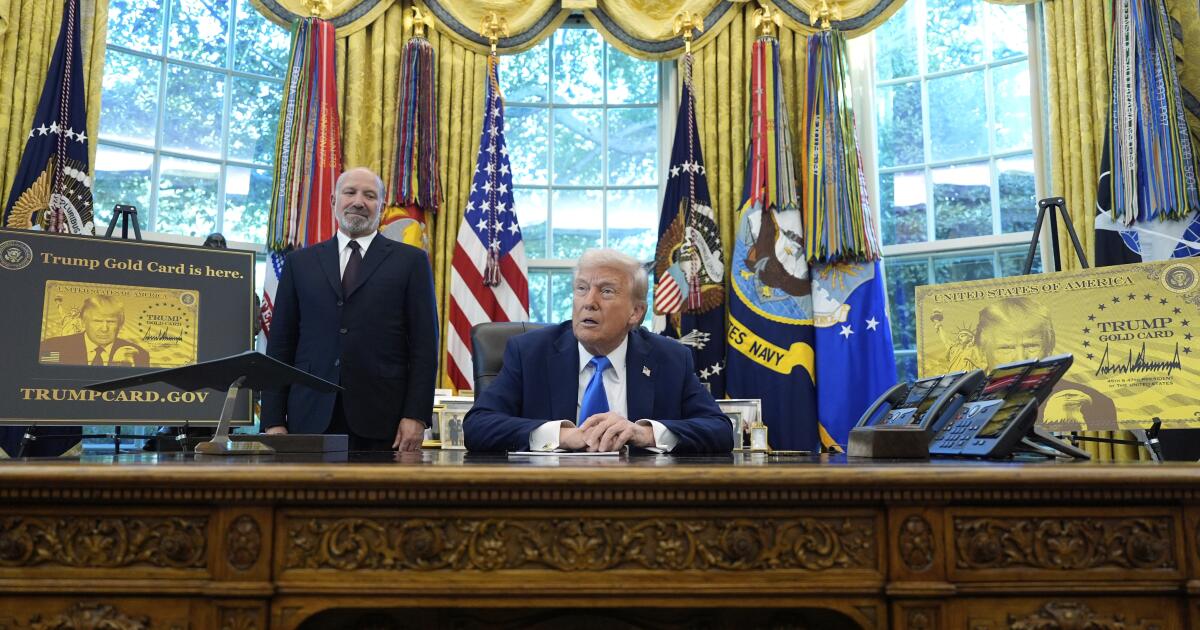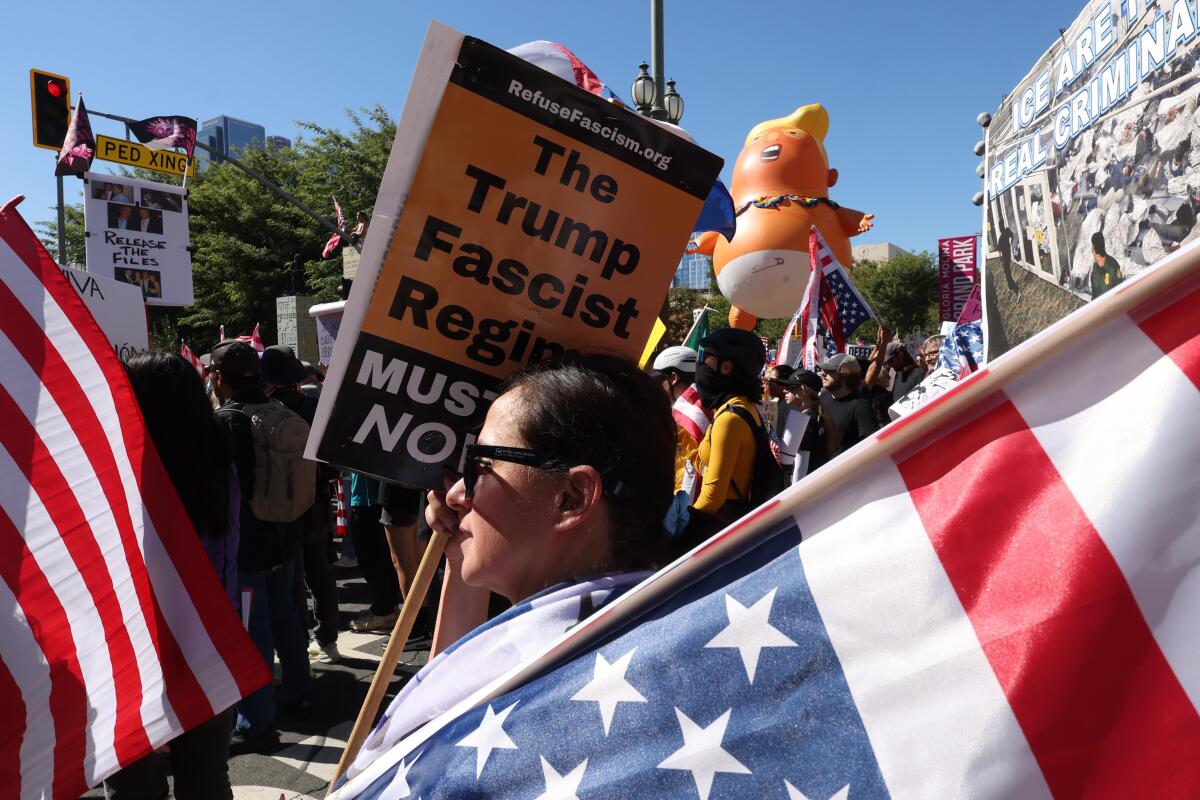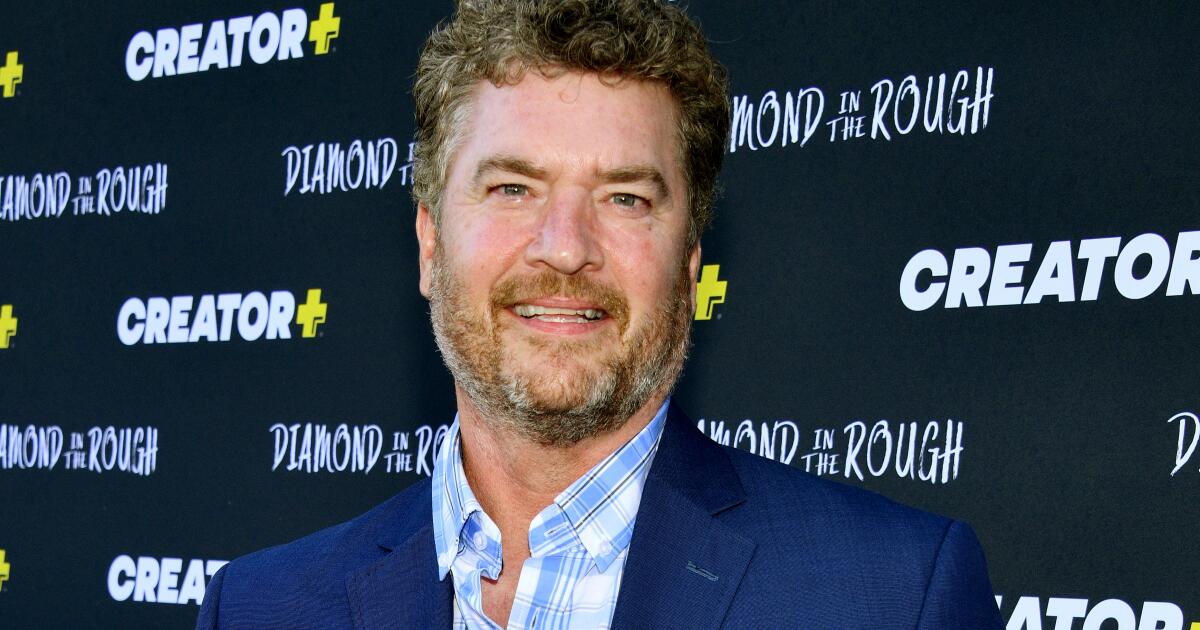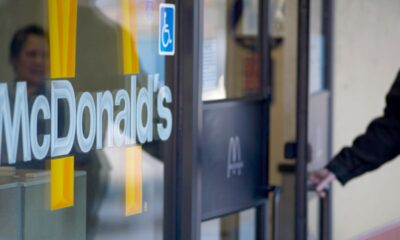Politics
Biden tests positive for COVID, will self-isolate in Delaware, White House says

President Biden tested positive for COVID-19 on Wednesday following his first event in Las Vegas and will self-isolate in Delaware, the White House said.
Biden tested positive for the virus on Wednesday, White House press secretary Karine Jean-Pierre said in a statement. She said the president was “vaccinated and boosted” and was experiencing mild symptoms.
“He will be returning to Delaware where he will self-isolate and will continue to carry out all of his duties fully during that time,” Jean-Pierre said. “The White House will provide regular updates on the President’s status as he continues to carry out the full duties of the office while in isolation.”
A maskless Biden arrived at Harry Reid International Airport in Nevada on Wednesday afternoon, following the announcement of his diagnosis. Reporters questioned him about his condition as he walked to Air Force One.
COVID VACCINE COMPANIES TOLD TO FOCUS ON KP.2 FOR FALL SHOTS, PER FDA ANNOUNCEMENT
President Biden gives a thumbs up to reporters as he boards Air Force One in Nevada on Wednesday. The president said he “feels good” following his COVID diagnosis. (POOL)
“I feel good,” he told reporters.
In a post on X, Biden acknowledged his COVID diagnoses.
“I will be isolating as I recover, and during this time I will continue to work to get the job done for the American people,” he wrote.
Biden’s doctor said the president came down with upper respiratory symptoms, a runny nose and non-productive cough, with general mailaise.
“He felt okay for his first event of the day, but given that he was not feeling better, point of care testing for COVID-19 was conducted, and the results were positive for the COVID-19 virus,” the physician said in a statement shared by the White House. “Given this, the President will be self-isolating in accordance with CDC guidance for symptomatic individuals.”
His temperature was at 97.8 degrees, which is normal, the doctor said.
“The President has received his first dose of Paxlovid,” the White House said. “He will be self-isolating at his home in Rehoboth.”
Biden was slated to speak at the UnidosUS Annual Conference in Las Vegas, which draws thousands of Latino advocates to Nevada, a crucial swing-state.
“I was just on the phone with President Biden. And he shared his deep disappointment at not being able to join us this afternoon,” UnidosUS President and CEO Janet Murguía told attendees. “The president has been at many events as we all know and he just tested positive for COVID.”
The illness comes as Biden faces mounting pressure from within the Democratic Party, as well as donors, to drop out of the presidential race amid concerns about his physical and mental state.

Politics
Marjorie Taylor Greene criticizes Trump’s meetings with Zelenskyy, Netanyahu: ‘Can we just do America?’

NEWYou can now listen to Fox News articles!
Rep. Marjorie Taylor Greene, R-Ga., on Sunday called for President Trump to only focus on America’s needs as the president meets with Ukrainian President Volodymyr Zelenskyy and Israeli Prime Minister Benjamin Netanyahu.
The president has been heavily involved in the Russia-Ukraine and Israel-Hamas conflicts since returning to the White House.
Trump met with Zelenskyy on Sunday at Mar-a-Lago to discuss a peace plan aimed at ending the Russia-Ukraine war that began with an invasion by Moscow in February 2022.
Netanyahu arrived in Florida on Sunday ahead of their scheduled meeting on Monday at Trump’s estate to address Israel’s conflicts in the Middle East. It will be the sixth meeting of the year between the two leaders.
TRUMP ZELENSKYY SAY UKRAINE PEACE DEAL CLOSE BUT ‘THORNY ISSUES’ REMAIN AFTER FLORIDA TALKS
Rep. Marjorie Taylor Greene criticized President Donald Trump’s meetings with Ukrainian President Volodymyr Zelenskyy and Israeli Prime Minister Benjamin Netanyahu. (Anna Moneymaker/Getty Images)
Greene, responding to Trump’s meeting with Zelenskyy and Netanyahu, said that the Trump administration should address the needs of Americans rather than becoming further involved in global conflicts.
“Zelensky today. Netanyahu tomorrow,” she wrote on X.
President Donald Trump welcomes Ukrainian President Volodymyr Zelenskyy at his Mar-a-Lago residence in Palm Beach, Florida. (Jim WATSON / AFP via Getty Images)
“Can we just do America?” the congresswoman continued.
The congresswoman has been a vocal critic of supplying U.S. military aid to foreign countries amid the conflicts in Europe and the Middle East.
She has also referred to Zelenskyy as “a dictator who canceled elections” and labeled Israel’s military campaign in Gaza as a genocide and humanitarian crisis.
ZELENSKYY READY TO PRESENT NEW PEACE PROPOSALS TO US AND RUSSIA AFTER WORKING WITH EUROPEAN TALKS
Rep. Marjorie Taylor Greene and President Donald Trump had a public feud in recent months. (Getty Images)
CLICK HERE TO DOWNLOAD THE FOX NEWS APP
This comes after Taylor Greene, who is set to resign from the House in January, had a public spat with Trump over the past few months as Trump took issue with the Georgia Republican’s push to release documents related to the investigations into deceased sex predator Jeffrey Epstein.
Trump had withdrawn his endorsement of Greene and called her a “traitor” over the public feud.
Politics
Commentary: America tried something new in 2025. It’s not going well

Is there a dumpster somewhere to torch and bury this year of bedlam, 2025?
We near its end with equal amounts relief and trepidation. Surely we can’t be expected to endure another such tumultuous turn around the sun?
It was only January that Donald Trump moved back into the White House, apparently toting trunkloads of gilt for the walls. Within weeks, he’d declared an emergency at the border; set in motion plans to dismantle government agencies; fired masses of federal workers; and tariffs, tariffs, tariffs.
Demonstrators at a No Kings rally in Washington, protesting actions by President Trump and Elon Musk.
(Jose Luis Magana / Associated Press)
By spring, the administration was attacking Harvard as a test case for strong-arming higher education. By June, Trump’s grotesquely misnamed Big Beautiful Bill had become law, giving $1 trillion in tax cuts to billionaires and funding a deportation effort (and armed force) that has fundamentally reshaped American immigration law and ended any pretense about targeting “the worst of the worst.”
Fall and winter have brought questionable bombings of boats in the Caribbean, a further backing away from Ukraine, a crackdown on opposition to Trump by classifying it as leftist terrorism and congressional inaction on healthcare that will leave many struggling to stay insured.
That’s the short list.
It was a year when America tried something new, and while adherents of the MAGA movement may celebrate much of it, our columnists Anita Chabria and Mark Z. Barabak have a different perspective.
Here, they renew their annual tradition of looking at the year past and offering some thoughts on what the new year may bring.
Chabria: Welp, that was something. I can’t say 2025 was a stellar year for the American experiment, but it certainly will make the history books.
Before we dive into pure politics, I’ll start with something positive. I met a married couple at a No Kings rally in Sacramento who were dressed up as dinosaurs, inspired by the Portland Frog, an activist who wears an inflatable amphibian suit.
When I asked why, the husband told me, “If you don’t do something soon, you will have democracy be extinct.”

Crowds participate in No Kings Day in downtown Los Angeles in October.
(Genaro Molina / Los Angeles Times)
I loved that so many Americans were doing something by turning out to not just protest policies that hit personally, but to rally in support of democracy writ large. For many, it was their first time taking this kind of action, and they were doing it in a way that expressed optimism and possibility rather than giving in to anger or despair. Where there is humor, there is hope.
Barabak: As in, it only hurts when I laugh?
In 2024, a plurality of Americans voted to reinstall Trump in the White House — warts, felony conviction and all — mainly in the hope he would bring down the cost of living and make eggs and gasoline affordable again.
While eggs and gas are no longer exorbitant, the cost of just about everything else continues to climb. Or, in the case of beef, utility bills and insurance, skyrocket.

The John F. Kennedy Memorial Center for the Performing Arts is another of the long-standing institutions Trump has smeared his name across.
(Jacquelyn Martin / Associated Press)
Meantime, the president seems less concerned with improving voters’ lives than smearing his name on every object he lays his eyes on, one of the latest examples being the John F. Kennedy Center for the Performing Arts.
(The only place Trump doesn’t want to see his name is in those voluminous Epstein files.)
I wonder: Why stop there? Why not brand these the United States of Trump-erica, then boast we live in the “hottest” country on Planet Trump?
Chabria: Stop giving him ideas!
You and I agree that it’s been a difficult year full of absurdity, but we’ve disagreed on how seriously to take Trump as a threat to democracy. As the year closes, I am more concerned than ever.
It’s not the ugly antics of ego that alarm me, but the devastating policies that will be hard to undo — if we get the chance to undo them.
The race-based witch hunt of deportations is obviously at the top of that list, but the demolition of both K-12 and higher education; the dismantling of federal agencies, thereby cutting our scientific power as a nation; the increasing oligarchy of tech industrialists; the quiet placement of election deniers in key election posts — these are all hammers bashing away at our democracy.
Now, we are seeing overt antisemitism and racism on the MAGA right, with alarming acceptance from many. The far right has championed a debate as dumb as it is frightening, about “heritage” Americans being somehow a higher class of citizens than nonwhites.

Vice President JD Vance speaks at the University of Mississippi in Oxford.
(Gerald Herbert / Associated Press)
Recently, Vice President JD Vance gave a speech in which he announced, “In the United States of America, you don’t have to apologize for being white anymore,” and Trump has said he wants to start taking away citizenship from legal immigrants. Both men claim America is a Christian nation, and eschew diversity as a value.
Do you still think American democracy is secure, and this political moment will pass without lasting damage to our democratic norms?
Barabak: I’ll start with some differentiation.
I agree that Trump is sowing seeds or, more specifically, enacting policies and programs, that will germinate and do damage for many years to come.
Alienating our allies, terrorizing communities with his prejudicial anti-immigrant policies — which go far beyond a reasonable tightening of border security — starving science and other research programs. The list is a long and depressing one, as you suggest.
But I do believe — cue the trumpets and cherubs — there is nothing beyond the power of voters to fix.
To quote, well, me, there is no organism on the planet more sensitive to heat and light than a politician. We’ve already seen an anti-Trump backlash in a series of elections held this year, in red and blue state alike. A strong repudiation in the 2026 midterm election will do more than all the editorial tut-tutting and protest marches combined. (Not that either are bad things.)

A stressed-out seeming poll worker in a polling station at Los Angeles’ Union Station.
(Eric Thayer / Los Angeles Times)
The best way to preserve our democracy and uphold America’s values is for unhappy citizens to register their dissent via the ballot box. And to address at least one of your concerns, I’m not too worried about Trump somehow nullifying the results, given legal checks and the decentralization of our election system.
Installing lawmakers in Congress with a mandate to hold Trump to account would be a good start toward repairing at least some of the damage he’s wrought. And if it turns into a Republican rout, it’ll be quite something to watch the president’s onetime allies run for the hills as fast as their weak knees allow.
Chabria: OMG! It’s a holiday miracle. We agree!
I think the midterms will be messy, but I don’t think this will be an election where Trump, or anyone, outright tries to undo overall results.
Although I do think the groundwork will be laid to sow further doubt in our election integrity ahead of 2028, and we will see bogus claims of fraud and lawsuits.
So the midterms very well could be a reset if Democrats take control of something, anything. We would likely not see past damage repaired, but may see enough opposition to slow the pace of whatever is happening now, and offer transparency and oversight.
But the 2026 election only matters if people vote, which historically is not something a great number of people do in midterms. At this point, there are few people out there who haven’t heard about the stakes in November, but that still doesn’t translate to folks — lazy, busy, distracted — weighing in.
If proposed restrictions on mail-in ballots or voter identification take effect, even just in some states, that will also change the outcomes.
But there is hope, always hope.
Barabak: On that note, let’s recognize a few of the many good things that happened in 2025.
MacKenzie Scott donated $700 million to more than a dozen historically Black colleges and universities, showing that not all tech billionaires are selfish and venal.
The Dodgers won their second championship and, while this San Francisco Giants fan was not pleased, their seven-game thriller against the Toronto Blue Jays was a World Series for the ages.
And the strength and resilience shown by survivors of January’s SoCal firestorm has been something to behold.
Any others, beside your demonstrating dinos, who deserve commendation?

Pope Leo XIV waves after delivering the Christmas Day blessing from the main balcony of St. Peter’s Basilica at the Vatican.
(Gregorio Borgia / Associated Press)
Chabria: Though I’m not Catholic, I have been surprisingly inspired by Pope Leo XIV.
So I’ll leave us with a bit of his advice for the future: “Be agents of communion, capable of breaking down the logic of division and polarization, of individualism and egocentrism.”
Many of us are tired, and suffering from Trump fatigue. Regardless, to put it in nonpapal terms, it may be a dumpster — but we’re all in it together.
Barabak: I’d like to end, as we do each year, with a thank you to our readers.
Anita and I wouldn’t be here — which would greatly please some folks — but for you. (And a special nod to the paid subscribers out there. You help keep the lights on.)
Here’s wishing each and all a happy, healthy and prosperous new year.
We’ll see you again in 2026.
Politics
The biggest losers of 2025: Who fell flat as the year closed

NEWYou can now listen to Fox News articles!
2025 didn’t just expose Democratic divisions — it created a short list of political losers whose missteps are already shaping the battlefield for 2026. From establishment leaders squeezed by a restless progressive base to national figures who burned precious time, this past year has left behind a series of cautionary tales for a party out of power.
MODERATE DEMOCRATS PUSH BACK AS PROGRESSIVES MOVE TO OUST JEFFRIES, CLARK OVER TRUMP STRATEGY
Senate Minority Leader Chuck Schumer, D-N.Y., right, and House Minority Leader Hakeem Jeffries, D-N.Y., walk speak to members of the media outside the West Wing at the White House in Washington, Monday, Sept. 29, 2025, in Washington. (AP Photo/Evan Vucci)
Establishment and old-school Democrats
The loudest, most visible Democratic figures haven’t just voiced opposition to the Trump administration — they’ve also made it clear they expect a new version of the party to emerge going forward. From Mayor-elect Zohran Mamdani in New York City promising expansive government program increases to Rep. Alexandria Ocasio-Cortez’s hint that she could beat Vice President J.D. Vance in a bid for the presidency, progressives can easily say they had some of the most visible momentum in 2025.
And that’s bad news for old-school Democrats.
As recently as last month, both House Minority Leader Hakeem Jeffries, D-N.Y., and House Whip Katherine Clark, D-Mass., faced primary challenges from their progressive base. These challengers cited dissatisfaction with their resistance against the administration. It’s unclear if those calls are disproportionately loud in a moment where Democrats find themselves out of power. But many moderate Democrats told Fox News Digital they don’t think it’s helping win over the electorate’s political middle.
Should progressives continue to crowd out the picture in 2026, more establishment Democrats may find it increasingly difficult to ignore pressure from their far-left flank as the nation heads into the midterms.
GOP SEIZES ON DEM CIVIL WAR AS PROGRESSIVES JUMP INTO KEY 2026 SENATE RACES: ‘THEY’RE IN SHAMBLES’
California Gov. Gavin Newsom speaks during a campaign event in support of Proposition 50 in San Francisco, Monday, Nov. 3, 2025. (Gabrielle Lurie/San Francisco Chronicle via Getty Images)
Gavin Newsom
California Gov. Gavin Newsom is running out of time to prove why he could be something more than a party messaging figure. In the past year, he’s pigeonholed himself into exactly that role.
In 2025, Newsom cemented himself as one of the key Democratic foils to Trump’s agenda. And on that front, there’s little question he capitalized on the attention.
Most notably, Newsom pushed through a redistricting effort meant to squeeze five Republicans out of office after Texas advanced a similar plan earlier this year. While the plan received mixed reviews — even from Democrats in the state who were wary of fighting fire with fire — it has certainly advanced Newsom’s national status.
But like every would-be Trump foil, Newsom finds himself somewhat reliant on Trump for his next move. Should Newsom begin to position himself for a 2028 bid for the White House, he won’t have that luxury around forever, and he only has one more year as California’s governor.
Newsom burned precious time in 2025 to show voters in California and across the country what kind of executive he could be.
DEMOCRATIC HEAVYWEIGHTS HARRIS, NEWSOM TURN HEADS, FUEL 2028 SPECULATION
Former President Joe Biden talks to reporters on the South Lawn of the White House, Monday, Sept. 2, 2024, in Washington, D.C. (AP Photo/Mark Schiefelbein)
Joe Biden
On several key issues, former President Joe Biden’s legacy has already grown old in 2025.
It took just weeks for the Trump administration to dismantle the claim that Biden was doing everything he could to stop illegal border crossings from pouring into the United States. With a few key executive orders, Trump brought the country to one of its lowest levels of border encounters ever.
And while that’s the most notable entry, the list of double-takes doesn’t end there.
An autopen investigation in the House of Representatives revealed Biden had delegated an unprecedented amount of authority to his aides. Moreover, a book put out by Jake Tapper and Alex Thompson took a deep look at just how hard his inner circle had worked to maintain the president’s image amid concerns about his age and cognitive ability.
Taken together, Biden’s administration just one year removed has plunged Democrats into questions of where to go next and provided Republicans with a wealth of evidence to make the case Democrats weren’t as transparent about the country’s problems as they could have been.
‘ROCK STAR’ NEWSOM STEALS THE SHOW AT DNC SUMMIT AS DEMOCRATS HUNT FOR 2028 CONTENDER TO TAKE ON TRUMP
Senate Majority Leader Chuck Schumer gives a thumbs up as he walks out of the Senate Chamber after speaking on the floor of the Senate on Dec. 20, 2024. (Kent Nishimura/Getty Images)
Chuck Schumer
Few political figures have had as politically damaging a year in 2025 as the Senate minority leader, Chuck Schumer, D-N.Y.
He received most of the blame for a disastrous 43-day government shutdown that largely left Democrats empty-handed. While Schumer himself didn’t vote with the eight Democrats who eventually supported a Republican plan to end the shutdown, he received calls to step aside in the aftermath for failing to keep Senate Democrats on the same page.
According to many Republicans, the political calculus for Schumer during the shutdown was more about putting up a good enough fight to appease the progressive side of the Democratic base.
But Schumer also failed to do that too.
During the shutdown, the New York City mayoral race had come to its final stretch with little word from the Senate Minority Leader. When it became clear the self-proclaimed socialist Zohran Mamdani would capture the party’s nomination, Schumer tried to dodge questions about whether he would support his bid. That reluctance never went away and questions about the relationship between the two Democrats only intensified.
Just days removed from the election, Schumer continued to give non-answers about Mamdani.
CLICK HERE TO DOWNLOAD THE FOX NEWS APP
Now at the close of 2025, Schumer has left questions unanswered about whether he can still effectively lead the party and whether he represents the party’s future.
-

 Entertainment4 days ago
Entertainment4 days agoHow the Grinch went from a Yuletide bit player to a Christmas A-lister
-

 Connecticut4 days ago
Connecticut4 days agoSnow Accumulation Estimates Increase For CT: Here Are The County-By-County Projections
-

 Entertainment5 days ago
Entertainment5 days agoPat Finn, comedy actor known for roles in ‘The Middle’ and ‘Seinfeld,’ dies at 60
-

 Milwaukee, WI5 days ago
Milwaukee, WI5 days ago16 music and theater performances to see in Milwaukee in January 2026
-

 World1 week ago
World1 week agoPutin says Russia won’t launch new attacks on other countries ‘if you treat us with respect’
-

 Indianapolis, IN2 days ago
Indianapolis, IN2 days agoIndianapolis Colts playoffs: Updated elimination scenario, AFC standings, playoff picture for Week 17
-

 Southeast3 days ago
Southeast3 days agoTwo attorneys vanish during Florida fishing trip as ‘heartbroken’ wife pleads for help finding them
-

 World3 days ago
World3 days agoSnoop Dogg, Lainey Wilson, Huntr/x and Andrea Bocelli Deliver Christmas-Themed Halftime Show for Netflix’s NFL Lions-Vikings Telecast


















